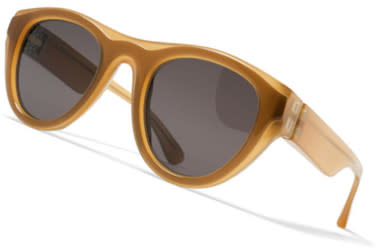Prescription sunglasses: A guide to the best lenses

Your glasses may give you excellent vision indoors and at night but they can't provide optimum vision outdoors on a sunny day.
For that, you need prescription sunglasses.
Advantages of prescription sunglasses
If you need vision correction, there's no substitute for prescription sunglasses outdoors.

Only prescription sunglasses give you the best possible vision correction and a wide variety of tints to give you the most comfortable vision possible in bright conditions.
If you want the best protection from glare and eye strain on sunny days, choose prescription sunglasses with polarised lenses. These lenses have a special filter that block light reflections off water, sand, pavement and car bonnets and boots.
Even if you wear contact lenses (and nonprescription sunglasses over your contacts when you go outdoors), a separate pair of prescription sunglasses is still a good investment. The prescription sunglasses give you the option to remove your contacts if they feel dry or uncomfortable at the beach or elsewhere outdoors and still be able to see clearly and comfortably on sunny days.
Also, wearing your contact lenses while swimming is a bad idea because it increases your risk of serious eye infections like acanthamoeba keratitis. Swimming without your contacts and having your prescription sunglasses poolside is a much better plan.
Prescription sunglasses are available for virtually any lens prescription, including progressive lenses if you are presbyopic and need to see clearly at all distances after age 40.
READY TO SHOP FOR SUNGLASSES? Find an optometrist near you to help you pick out prescription sunglasses.
Unlimited lens options
Prescription sunglasses are available in virtually all lens materials, including lightweight polycarbonate, Trivex, high-index plastic and even glass.
Glass lenses are no longer a popular choice for sunglasses because they are much heavier than lenses made of other materials, and they can shatter easily. However, they are still available in some lens types if you request them.
Another sun-wear option is to purchase prescription spectacle lenses that have a photocrhomic tint that darkens automatically in sunlight.
However, to be clear, many photochromic lenses don't darken behind your car windscreen. If you want the best prescription sunglasses with a sun-activated tint for driving, ask your optometrist to show you only photochromic sun lenses that are designed for use when driving as well as for outdoors in direct sunlight.
UV protection
Style is important, but your primary concern when buying prescription sunglasses should be that the lenses block 100 percent of the sun's harmful UV rays.
UV protection is unrelated to the colour and density of the tint in sunglass lenses (including those in prescription sunglasses), so you can choose any lens colour and darkness you like, as long as your optometrist verifies that the lenses provide 100 percent UV protection.
Cost of prescription sunglasses
Yes, a pair of quality prescription sunglasses is an investment but the protection they offer, particularly if you spend a significant amount of time outdoors, plus the value you get from them — seeing clearly and comfortably with no sun-induced eye strain — makes the investment more than worthwhile.
Many optical practices offer special discounts on prescription sunglasses if you purchase them at the same time you buy your regular spectacles. Sometimes, payments like zipPay and Afterpay are available. Ask for details from an optometrist near you.
Page published on Wednesday, 18 March 2020






